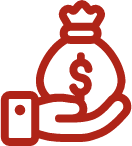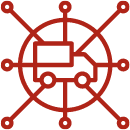When we design loyalty programs we pull on years of experience and collaboration with leaders in the field.
Whether you’re building loyalty with direct users, distributors, channel partners, or via your sales staff, these principles form the foundation of a profitable, sustainable customer loyalty strategy.
Design principle 1: Hard and soft benefits
As we previously learned, customers respond best to a balanced combination of economic rewards and intangible recognition. B2B programs also balance personal with business rewards.

Hard benefits
Economic rewards are based upon an accrued account that builds over time. Rewards are relevant, achievable, and of high perceived value.

Soft benefits
Recognition elements are designed to make customers feel valued. Offered proportional to customer value and tied to your brand persona.
Design principle 2: Tiered benefits
Whether you publish defined program tiers or tier your customers behind the scenes, tiering benefits are essential to targeting your budget where it can have the greatest impact.
For Example:
- Over-funding high-value segments
-
Under-funding high-potential segments
-
Reserve best benefits for highest-value customers
-
Create aspirational benefits to drive tier migration
Design principle 3: Targeted bonuses
Begin with a low base funding rate and test bonus offers to drive profitable behavior. Then design offers based on dimensional variables to motivate specific customer behavior changes:

TRANSACTIONAL
“Spend more!”

SPATIAL

TEMPORAL

PERSONAL
Design principle 4: Relevant dialogue
Use customer and client data to deliver timely, relevant, and personalized offers and communications optimized through your customer’s preferred communication channel.
THE DRIP DIALOGUE METHOD:

Collect one useful data point


Send a relevant offer to customer


Measure results, not costs

Collect one useful data point


Send a relevant offer to customer


Measure results, not costs
The three key foundational elements of B2B loyalty strategy design:

DEFINED OBJECTIVES
Clearly defined and C-suite supported.

MULTI-CHANNEL
Include distributors, channels, and sales.

MULTI-PLATFORM
Include physical, web, and mobile.
Design principle 5: Measure everything
No loyalty strategy should launch without a rigorous measurement plan to gauge progress against your stated objectives.
Build or outsource analytical resources and deploy data for:

Marketing Analysis

Media Optimisation

Product Development

Pricing Model

Financial Reporting
Design principle 6: Strategic planning
The key to the long-term success of your loyalty strategy is to plan ahead – conduct regular strategy reviews so you can respond swiftly to competitive and market forces.
Plan for:

ACTIONABLE INSIGHTS

NEW TECHNOLOGIES

MARKET FORCES
Design principle 7: Strategic partnerships
Call it OPM – Other People’s Money. By allowing partners fee-based access to your customer data, you can enhance your program without breaking the bank.
Potential partners include:

MANUFACTURERS

DISTRIBUTORS

COMPLIMENTARY BRANDS
Partner with non-competitors who want to reach your customers.
Design principle 8: Customer engagement
B2B loyalty programs are serious business – but that doesn’t mean you can’t have fun. Build in program engagement elements to encourage an emotional connection.
Tactics include:

AUCTIONS
Increase earning velocity without breaking the bank.

SWEEPSTAKES
Add big-ticket rewards to jump-start excitement.

COMMUNITY EVENTS
Help your members do well by doing good.


